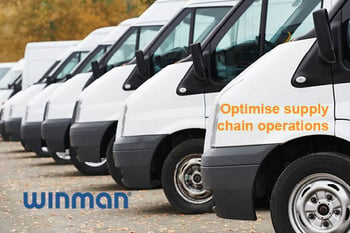Virtually all industries rely on ERP software to streamline operations, minimise waste, and ensure efficiency.
Shipping and logistics are key aspects of your daily operations which need solid tools to enable management and ensure business success. So, what are the benefits of an integrated shipping and logistics tool across your business?
What does distribution and shipping software do?
Distribution software manages the automation of distribution and logistics tasks. Therefore, offering your business an organised, accurate, and updated way of handling all parts of your inventory control, order processing, sales, product shipping, customer support, customer relationship management, accounting and more. The software is centralised, and thus accessible by all departments in your business, providing relevant information for each team’s operations, as well as compiling reports for better management and forward planning. As such, all departments work in harmony, each delivering on the requests of the others, to ensure enhanced collective performance.
Distribution and shipping operations fall under the umbrella of enterprise resource planning. Therefore, distribution and shipping software is part of your ERP software, depending on its size and nature of operations. ERP combines different functions aimed at internal and external customers for better business and resource management.
What are the benefits of integrated shipping and logistics in your ERP solution?
Benefit 1: Real-time data
Decisions, predictions, and promises work best when you make them while relying on accurate and up-to-date information. An integrated ERP system produces real-time data which includes accounting, inventory counts, and key performance indicators. For example, sales representatives with access to such data can confidently inform customers which items are in stock and how many of them they can access. Additionally, product manufacturers will plan activities to ensure sufficient stock is available to cater to the demands of all branches. Furthermore, repairs or maintenance departments can access shop floor machinery to effectively schedule duties to coincide with production downtime to keep all machines running smoothly.
Benefit 2: Process automation
Automating data entry, accounts reconciliation, and system updates significantly increases accuracy and production efficiency. Automation is especially vital in inventory management, where stocks reaching a predetermined level will trigger production orders to ensure the items never run out. Imagine how often your business would run out of an item without automation.
Benefit 3: Unified source of information
Having one interconnected database reduces the chances of duplicate data entry, human error, and the need for manual searching. This ensures better communication with a single point of reference, further improving operations.
Benefit 4: Supply chain optimisation
Integrating shipping and logistics with other functions in your ERP system allows you to optimise all your businesses’ operations. Accurately predicting inventory demand increases, manufacturing efficiency while reducing waste and redundancy across processes, further reducing costs and maximising returns.
Benefit 5: Workflow visualisation
A centralised database lets you visualise how different departmental functions mesh and align. The ability to see what other departments and teams are working on will help your planning and forecasting.
Benefit 6: Mobile device access
Integrated ERP solutions enable different team members to have access to the right data at any time, anywhere. For example, a sales representative may only need to look through their portable devices to quickly check which products are in stock whilst sitting in front of a customer. Devices can be connected to the live ERP system, by user ID, ensuring accurate information at every moment, and even logging operator inputs for full traceability.
What’s to gain?
Integrated shipping and logistics improve and enhance your operations, taking care of the bottom line and placing your business data at the heart of your decisions, putting it in the best possible state to handle future uncertainties and demands. Get in touch with us today and let us provide you with a customised solution for your organisation’s needs.



.png?width=120&height=120&name=MicrosoftTeams-image%20(4).png)


